Research
The MAR objectives are grouped into five research areas, and each is coordinated by specialists in every theme.
MAR (Marine Animal Research) is a Oceanogràfic Foundation research programme led by Dr. Andreas Fahlman. Its purpose is to improve scientific knowledge about oceans and the life that lives in them. MAR promotes collaboration with other research centres all over the world, and the fact that experts from the Vancouver Aquarium are included in it is a good example of collaborative research.
Coordinator:
Dr. Andreas Fahlman
Physiology of marine vertebrates
We are studying the adaptations of the lungs and hearts of marine vertebrates which allow them to dive to extreme depths for long periods of time. This information will allow us to understand how changes to the natural environment, due to overfishing or climate change, may affect their survival chances.
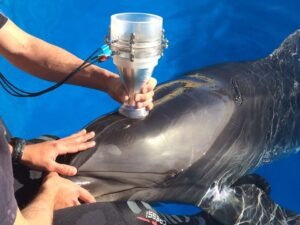
Medical image to study acoustic mechanisms in dolphins
In this project we will use the most advanced clinical imaging technology to determine the hearing and sound production mechanism in bottlenose dolphins.
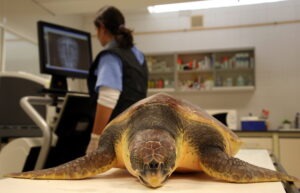
Health condition, fieldwork and rehabilitation of marine species
The animals with which we work, and for which we care, are used to test new methods or equipment to help us to understand wild animals. Therefore, our results and tools are also used to study their friends in the natural world, and to even help animals in rehabilitation. For example, by studying the variables that increase the likelihood of accidentally captured sea turtles suffering from gas embolism, we can provide simple mitigation strategies that may reduce the morbidity and mortality rates of these animals.
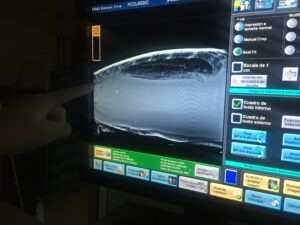
Physiological modelling
To gain a better understanding of physiological problems, complex tools are required that allow the limitation and modification of the physiological variables involved, and to develop hypotheses that can be empirically checked. To do so, we use mathematical models.
Coordinators:
Daniel García Párraga
Dr. José Manuel Sánchez Vizcaíno
Dr. Consuelo Rubio Guerri
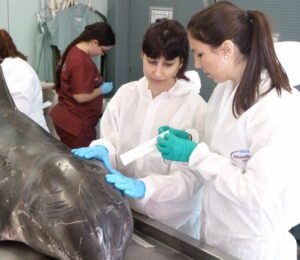
Forensic medicine in marine fauna
The Oceanogràfic Foundation forms part of the network of beached animals in the Valencian Community, which allows us access to all the sea animals that arrive on our coasts alive or dead. For this reason, especially regarding dolphins and turtles, we carry out an autopsy on all these animals to obtain more information about the cause of death. In turn, we obtain samples of all tissues for our sample bank so we can thereby carry out retrospective analyses in the future.
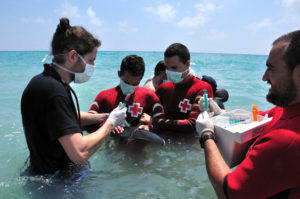
Detection and quantification of the viruses that affect marine mammals
Only a few viruses are found in marine mammals, but some such as Morbillivirus and herpesvirus are quite well-known. Morbillivirus is the virus that has caused the most mortality in the history for wild dolphins. This is why the detection of different viruses in each dead dolphin that appears in our community is necessary to rule out or confirm its role in the animal’s death.
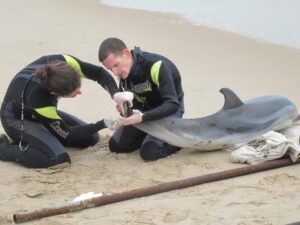
In vitro immunological studies
Immunology is the science based on the study of immune cells, which are those that protect us from all illnesses. This is why knowing an individual’s immune system reveals a great deal of information about their health condition and many other parameters. The main problem is that we do not know what the physiological parameters are in marine mammals and, therefore, we cannot detect when they are altered. With this study, we can detect normal parameters to thereby detect alterations to be able to prevent illnesses.
Coordinator:
Jose Luis Crespo
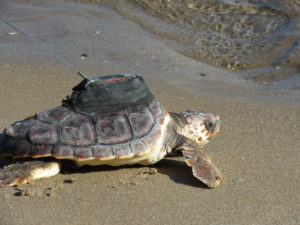
Satellite follow-up of marine turtles
Thanks to the latest technology in following up wild fauna via satellite, we are able to know the survival rates. adaptation, use of habitat and the dynamics of marine turtles’ movements at the end of their recovery process at the Oceanogràfic or of those from other conservation projects, such as “head-starting” or breeding in captivity. All this information allows us to assess their recovery success and the feasibility of the specimens bred in the Sea Ark, and also generates very important information about the marine environment to manage and protect these species.
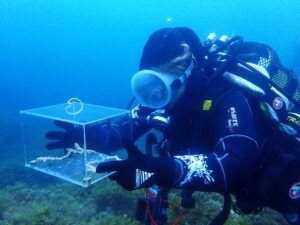
Satellite follow-up of fish on the open sea
As with the marine turtles, following up sharks beached on the coast via satellite, attended to by the Oceanogràfic Foundation’s rescue team, and sunfish, generates relevant information about the causes of regression that affect most elasmobranchii, or about the unknown migration patterns of sunfish throughout the Mediterranean Sea.
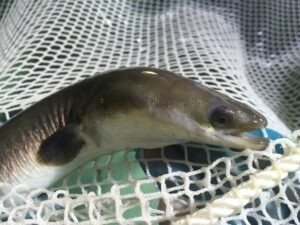
Reproduction of the European eel
In collaboration with Rara Avis Biotec, work is being done to develop the assisted reproduction techniques required to reproduce the European eel (Anguilla anguilla) in captivity. This species is in critical danger of extinction, is most relevant for aquatic ecosystems and has not been able to reproduce in captivity. The idea behind the innovative use of recombinant gonadotrophin hormones is to advance in this species’ reproduction in captivity, which would represent further efforts being made by several international groups to fulfil this goal.
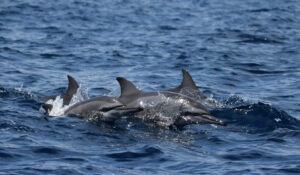
Acoustic
The purpose of this programme is to extend knowledge about communication in cetaceans, and to study the problems caused by noise produced by human activity in the communication and welfare of the animals that form part of wild populations.
Coordinators:
Daniel García Párraga
Dr. Xavier Manteca
Dr. Chelo Rubio Guerri
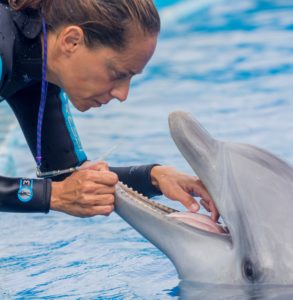
Defining important behavioural indicators of animal well-being for marine animals
As animal well-being is one of the essential pillars of our research, we decided to obtain some objective parameters to quantify this well-being in the animals at our aquarium.
Use of different keratin/mineral matrices to evaluate cortisol levels in marine vertebrates
The detection and quantification of cortisol in blood is one of the most closely related parameters with stress. However, some studies have been conducted on the measurement of cortisol in hair related with chronic stress. For this reason, taking measurements in hair, feathers or skin would allow us to greatly advance in determining stress non-invasively.
Research on the use of the size of telomeres and telomerase activity as an indicator of well-being in marine species
There are studies on humans which have reported a reduction in the size of telomeres in people with chronic depression or have suffered it in their childhood. For this reason, seeing this same relationship in marine animals as a chronic stress measurement would represent a great advance.
Study of the immune function as an indicator of well-being in marine fauna
There are studies on humans which identify that stress is correlated with immunodepression. We study changes in the immune condition of animals with higher levels of cortisol and changes in behaviour.
A new focus for assessing the behaviour and health of sea turtles in a controlled environment; seeking a sign of identity for this animal’s well-being
Vertebrates are considered sensitive beings. Thus understanding the necessary requirements for animal well-being in a controlled environment is a priority. An animal’s health is normally identified by physiological indicators, e.g., blood samples, but can also be checked by observing the animal’s behaviour. Although a physiological health examination is effective, it may also be stressful, and can require time and money. Examination of behaviour also requires time and may be subjective, and there is not a clear connection between behaviour and well-being in general. However, it must be acknowledged that behaviour may reflect an animal’s discomfort or well-being, which may be used as an indicator of health.
Above all, the behaviour quantification process could be standardised and simplified to make it more efficient and objective. The objective of this project is to use multi-sensory markers (Tags) to provide us with quantifiable information on behaviour. Thus by providing a series of objective measurements, a combination can be obtained that is a sign of identity of each behaviour.
Coordinator:
Dr. Francisco Torner
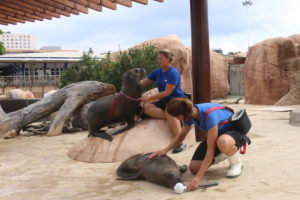
The rescue, safeness and assistance of sea lions for social purposes
This project intends to evaluate the potential of sea lions to help with sea rescue tasks and other activities of social interest. The training process with these animals will also help to acquire valuable information from the physiological and/or healthcare viewpoints to benefit their protection and conservation.
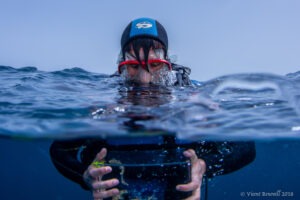
Evaluating expectations and impacts
A study about the Oceanogràfic’s impact, and the different scheduled activities on its visitors and on society in general. Here the intention is to measure the efficiency of our activity, and to assess the connection between biodiversity and society.